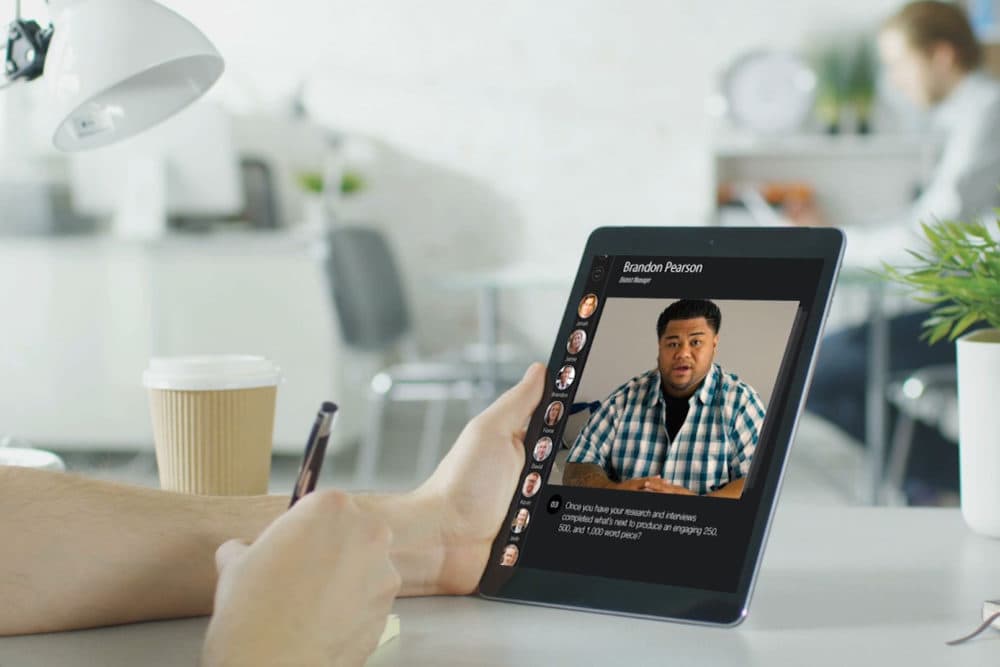Advertisement
Your AI Interviewer Will See You Now

Your next job interview might be conducted by a robot recruiter who's judging your competency on your facial expression and words.
Guests
Drew Harwell, technology reporter for the Washington Post covering artificial intelligence and the algorithms that are changing our lives. (@drewharwell)
Ifeoma Ajunwa, professor at Cornell University’s Industrial and Labor Relations School and a faculty member at Cornell Law School. (@iajunwa)
Tomas Chamorro-Premuzic, chief talent scientist at ManpowerGroup. Professor of business psychology at University College London and at Columbia University. Associate at Harvard’s Entrepreneurial Finance Lab. Author of "Why Do So Many Incompetent Men Become Leaders? (And How to Fix It)." (@drtcp)
Mary Cheddie, divisional director for the Eastern United States and the Caribbean at the Society of Human Resource Managers, and serves on its board of directors. Served for 30 years as the top human resources executive at major companies, for one of which she developed an AI interviewing system. (@SHRMMaryCheddie)
From The Reading List
Washington Post: "A face-scanning algorithm increasingly decides whether you deserve the job" — "An artificial intelligence hiring system has become a powerful gatekeeper for some of America’s most prominent employers, reshaping how companies assess their workforce — and how prospective employees prove their worth.
"Designed by the recruiting-technology firm HireVue, the system uses candidates’ computer or cellphone cameras to analyze their facial movements, word choice and speaking voice before ranking them against other applicants based on an automatically generated 'employability' score.
"HireVue’s 'AI-driven assessments' have become so pervasive in some industries, including hospitality and finance, that universities make special efforts to train students on how to look and speak for best results. More than 100 employers now use the system, including Hilton and Unilever, and more than a million job seekers have been analyzed."
Harvard Business Review: "Recruiting" — "Goldman Sachs is a people-centric business—every day our employees engage with our clients to find solutions to their challenges. As a consequence, hiring extraordinary talent is vital to our success and can never be taken for granted. In the wake of the 2008 financial crisis we faced a challenge that was, frankly, relatively new to our now 150-year-old firm. For decades investment banking had been one of the most sought-after, exciting, and fast-growing industries in the world. That made sense—we were growing by double digits and had high returns, which meant that opportunity and reward were in great supply. However, the crash took some of the sheen off our industry; both growth and returns moderated. And simultaneously, the battle for talent intensified—within and outside our industry. Many of the candidates we were pursuing were heading off to Silicon Valley, private equity, or start-ups. Furthermore, we were no longer principally looking for a specialized cadre of accounting, finance, and economics majors: New skills, especially coding, were in huge demand at Goldman Sachs—and pretty much everywhere else. The wind had shifted from our backs to our faces, and we needed to respond.
"Not long ago the firm relied on a narrower set of factors for identifying 'the best' students, such as school, GPA, major, leadership roles, and relevant experience—the classic résumé topics. No longer. We decided to replace our hiring playbook with emerging best practices for assessment and recruitment, so we put together a task force of senior business leaders, PhDs in industrial and organizational psychology, data scientists, and experts in recruiting. Some people asked, 'Why overhaul a recruiting process that has proved so successful?' and 'Don’t you already have many more qualified applicants than available jobs?' These were reasonable questions. But often staying successful is about learning and changing rather than sticking to the tried-and-true.
"Each year we hire up to 3,000 summer interns and nearly as many new analysts directly from campuses. In our eyes, these are the firm’s future leaders, so it made sense to focus our initial reforms there. They involved two major additions to our campus recruiting strategy—video interviews and structured interviewing."
Advertisement
Washington Post: "The new way your boss can tell if you’re about to quit your job" — "IBM wants to keep its employees from quitting, and it’s using artificial intelligence to do it.
"In a recent CNBC interview, chief executive Ginni Rometty said that thanks to AI, the tech and consulting giant can predict with 95 percent accuracy the employees who are likely to leave in the next six months. The 'proactive retention' tool — which IBM uses internally but is also selling to clients — analyzes thousands of pieces of data and then nudges managers toward the employees who may be on their way out, telling them to 'do something now so it never enters their mind,' Rometty said.
"IBM’s efforts to use AI to learn who might quit is one of the more high-profile recent examples of the way data science, 'deep learning' and 'predictive analytics' are increasingly infiltrating the traditionally low-tech human resources department, arming personnel chiefs with more rigorous tools and hard data around the tricky art of managing people."
This program aired on October 30, 2019.

